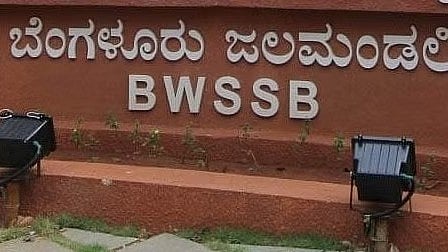
Bengaluru Water Supply and Sewerage Board (BWSSB).
Credit: Special Arrangement
Bengaluru: The groundwater table on the outskirts of the city has already fallen by at least 10 to 15 metres this year, and the situation is likely to worsen during peak pre-monsoon months of March and April.
Anticipating this rate of groundwater depletion, the Bangalore Water Supply and Sewerage Board (BWSSB) has cited IISc’s findings to urge apartment residents to reduce groundwater dependence and opt for Cauvery water connections instead.
These findings are part of a IISc-BWSSB collaborative study to tackle the water crises Bengaluru has witnessed in previous summers, one of the harshest of which occurred in 2024.
BWSSB assistant executive engineers across subdivisions are writing to apartment complexes to reasonably expect water shortages. One such letter dated February 10 noted that while the groundwater level in core areas has fallen by about five metres this year compared to 2024, it has fallen by about 10 to 15 metres in both the City Municipal Corporation areas and the 110 villages on the outskirts of the city.
According to the BWSSB, these areas are heavily dependent on borewells and tanker water, which could pinch their pockets as the days go by and a scarcity situation arises.
“We wanted to prepare our systems for the summer. That is why we, well in advance, formulated this collaborative effort to understand the pattern of groundwater depletion. In some areas, the groundwater is depleting very quickly, especially in the eastern and northern parts of the city. The groundwater is going down by 20 to 25 metres compared to previous years,” BWSSB chairman V Ramprasath Manohar told DH.
BWSSB has been warning residents, particularly those in apartments, to adopt Cauvery water connections instead of overexploiting groundwater through borewells. “Otherwise, the water tanker mafia will begin and increase rates once a scarcity situation occurs,” he said.
Water meter readers and BWSSB officials will begin their rounds from Saturday to ensure that potable water is used judiciously, penalise residents who continue to draw large amounts of water from borewells and use potable water for non-drinking purposes.
From April 1, the BBMP will hand over all borewells and RO plants to the BWSSB, which will become the sole agency for all drinking water needs in Bengaluru.
Additionally, to increase water connectivity, the BWSSB has also planned to set up 16 Cauvery Connect Centres in the 110 villages that come under Cauvery Stage V coverage area. Residents can book water tankers online by paying Rs 90 per tanker through an upcoming app being developed by the BWSSB. A senior engineer told DH that the plan is to operationalise these centres by the first week of March.
